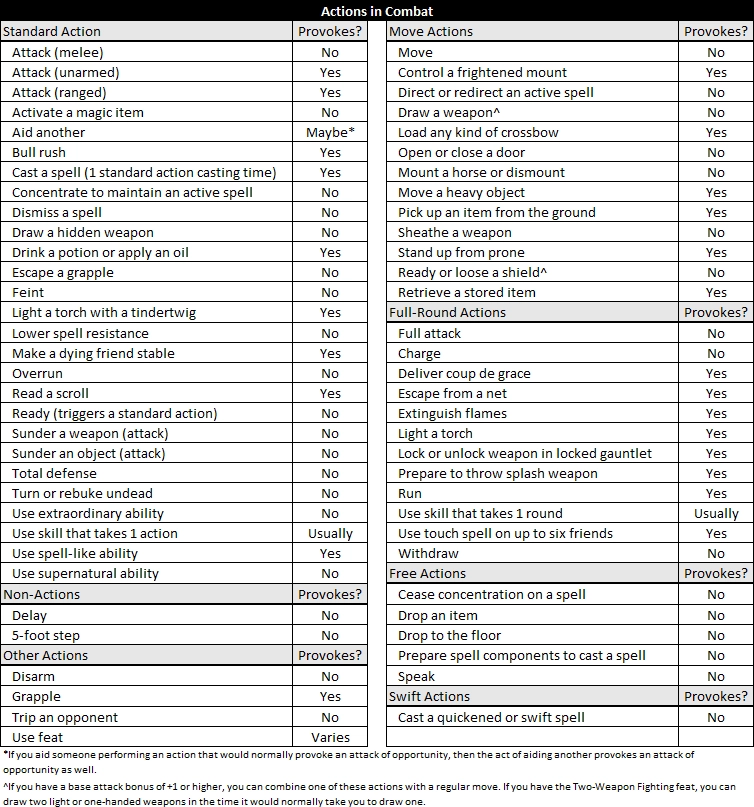Among the more exciting aspects of d20 are immediate actions and opportunity attacks. These are solid mechanics that engage players when it isn’t their turn. There is a football field of design space here, and immediate spells and AoOs only touch the sidelines.
I always wondered why opportunity attacks were separate from immediate actions when playing. They feel like they served the same purpose. Also, the rules for AoOs are confusing. Figuring out whether movement provokes an attack of opportunity can slow your game to a crawl and create a point of argument. That’s dumb. We want to make the game faster and more engaging – so let’s change opportunity attacks.
What follows are rules for d20 and 3.5e to codify a new action type, the reaction, and explore some of the potential depth in this new play space.
Deprecated or Modified Rules
New Action Type
Reaction: A reaction consumes a tiny amount of time but represents a significant effort and energy expenditure, allowing you to act when it is not your turn. You can only perform a reaction when it is not your turn, and you cannot use another reaction until your next turn. You cannot use a reaction if you are flat-footed or otherwise unable to act.
You cannot use a reaction in response to a reaction. In cases where multiple combatants want to use a reaction, the GM must resolve the first reaction before another reaction can be announced or resolved. When it is unclear who reacted first, the GM can use their discretion or rely on the combatants’ initiatives to decide.
Basic Reactions
Aid Ally: You may assist another character in melee combat. If you’re in the position to make a melee attack on an opponent that is engaging your ally in melee combat, you can aid your friend as a combat reaction.
Aid Ally’s Defense: As a reaction, before an opponent makes a melee attack against your ally, you grant your ally a +1 bonus to their AC against that attack.
Aid Ally’s Offense: As a reaction, before an ally makes a melee attack against your opponent, you grant your ally a +1 bonus to their attack roll.
Reactive Dodge: As a reaction, before an opponent makes an attack roll against you, you gain a +1 dodge bonus to your AC against that single attack.
Block: As a reaction, before an opponent makes an attack roll against you and only if you wield a bucker or shield, you gain DR/- against that attack equal to the shield’s bonus to your AC (including any magical effects). This DR stacks with other applicable DR for this attack.
Attack of Opportunity: As a reaction, you may make a single melee attack against an enemy you threaten who provokes an attack of opportunity. You attack your full normal attack bonus before resolving the action which provoked the attack.
Counterspell: As a reaction, you may attempt to counterspell another spellcaster when they begin casting a spell. If you identify the spell being cast with a Spellcraft check (DC 15 + spell level) and you can cast that spell’s counter, you cast the spell as a counter and automatically ruin the other spellcaster’s spell.
If you identify the spell being cast but cannot cast the spell’s counter, you may attempt to cast dispel magic, greater dispel magic, or the same spell being cast to counterspell the other spellcaster doesn’t always work. You make a dispel check by rolling 1d20 + your caster level (maximum +10 with dispel magic). The DC to counter the spell is 15 + the spellcaster’s level.
If you do not identify the spell or you cannot cast an appropriate spell, you cannot attempt to counter it and the identification attempt still counts as your reaction for this turn.
Attacks of Opportunity
Performing certain actions while in a threatened area can provoke attacks of opportunity as you shift your focus off nearby combatants. See the table below for an overview of many actions that provoke attacks of opportunity. No single action can provoke an attack of opportunity more than once from the same opponent.

New or Changed Feats
Combat Reflexes [General, Fighter]
Prerequisite: Dex 13.
Benefit: A character with Combat Reflexes may use a reaction while flat-footed.
Normal: A character may not use reactions while flat-footed.
Hold the Line [General, Fighter]
Prerequisites: Combat Reflexes, base attack bonus +2
Benefit: You may use a reaction to take an attack of opportunity against an opponent who enters an area you threaten. Your attack happens immediately; then, your opponent finishes their move and any remaining actions.
Your opponents are not automatically aware that moving into an area you threaten will provoke an attack of opportunity.
Normal: Movement does not normally provoke an attack of opportunity.
Parting Swing [General, Fighter]
Prerequisites: Hold the Line, base attack bonus +6
Benefit: You may use a reaction to take an attack of opportunity against an opponent who leaves an area you threaten. Your attack happens immediately; then, your opponent finishes their move and any remaining actions.
Your opponents are not automatically aware that moving out of an area you threaten will provoke an attack of opportunity.
Normal: Movement does not normally provoke an attack of opportunity.
Discerning Counterspeller [General]
Prerequisites: Improved Counterspell, Spellcraft 8 ranks
Benefit: If you correctly identify a spell during a counterspell reaction, you may choose not to counter the spell and retain your reaction.
Normal: Attempting to identify a spell during a counterspell reaction uses your reaction until your next turn.
Closing
There’s more space here, obviously, but we’re approaching 1500 words at this point and I don’t want to create any overwhelm. Take a look and let me know what you think; hit us up on Twitter or Facebook and share your thoughts.